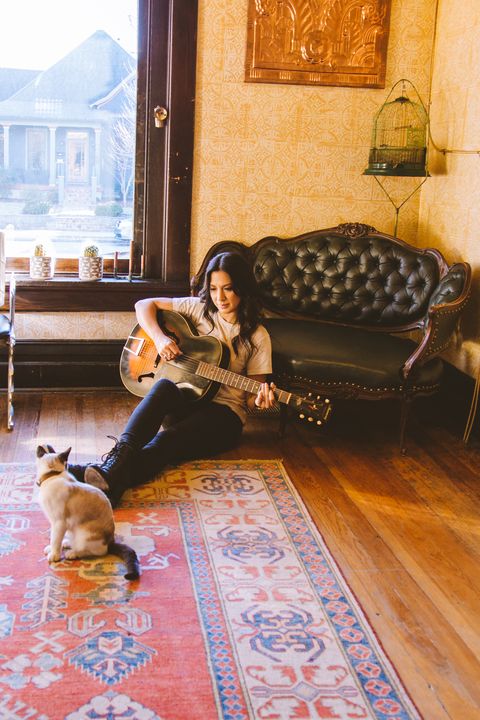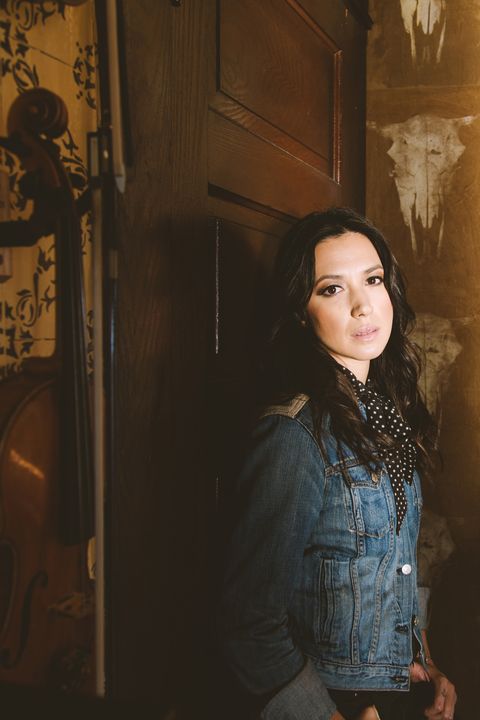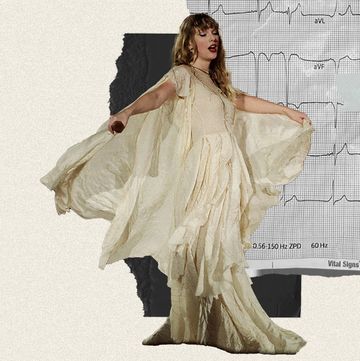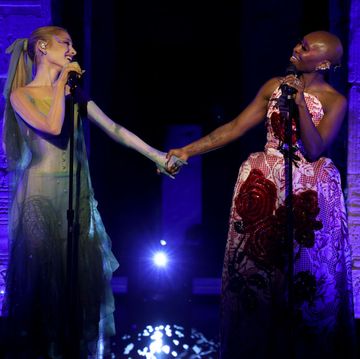Fourteen years after her last solo album, the "Everywhere" singer-songwriter is back with Hopeless Romantic, and ready to claim what major label execs wouldn't give her all those years ago: control.
In 2003, Michelle Branch seemed to flash-freeze in our collective pop cultural memory as the girl in hip-hugging boot-cut jeans and a black tank top. With two platinum albums and a crop of wildly catchy singles— "Everywhere," "All You Wanted," and "Are You Happy Now"—she was the voice of every love-struck high-schooler in the country, and still a teenager herself. In record time, she staked a place in the musical landscape. In between Britney Spears, the schoolgirl sexpot of pop, and the anti-Britney Avril Lavigne, with her Hot Topic-bought hostility, was Branch: the Everygirl.
It's been 14 years since Branch released her last solo album. In that time, Branch got married, had a child, separated from her husband, put out an album as part of a country music duo, and … largely disappeared. Even for fans who have the lyrics to her hits drilled into some layer of their subconscious, she was often still a product of early aughts nostalgia. But the past fourteen years were anything but fallow for Branch—and now, with a new label, a new life partner and musical collaborator in the Black Keys' Patrick Carney, and a new (and wildly different) album, Hopeless Romantic, she's back to reintroduce herself.
Branch began writing and composing her own music at 14, after her parents bought her a guitar for her birthday. Soon, with the help of her parents, she was playing gigs—a mix of original music and Lisa Loeb, Sheryl Crow, and Fleetwood Mac covers—at local bars and restaurants around her hometown of Sedona, Arizona. "Because they served alcohol, the minute I was done, I would have to leave the venue," she says. She eventually convinced her parents to let her split her time between Los Angeles and Sedona and finished up high school through homeschooling. At her shows, she sold a self-produced album, financed by her parents and later released by an indie label—a collection of lilting folk songs about love (or what a teenage girl imagined as love) called Broken Bracelet. Branch named it after this "ratty, beaded" thing given to her by Steve Poltz, she says, an indie guitarist and frequent Jewel collaborator whom she met backstage at a Lisa Loeb concert. Jewel had made the bracelet herself, he told her. When it broke, he said, she would become famous. "I was like, 'Okay, mister!'" says Branch with a mock eye roll. "It broke the day I signed to Maverick Records."
By the time she walked into the Maverick offices, Branch had already opened for Hansen, but the invitation to meet with the label, founded in part by Madonna under the Warner Bros. umbrella, was a daunting milestone. At 16 she joined the major label machine.
Two years later, in 2001, Branch released The Spirit Room. The lead single, "Everywhere," a full-throated, shout-it-from-the-rooftops love song, quickly burrowed into the teen consciousness and ascended the Billboard charts, where it stayed for 20 weeks. Her next two singles continued to build on her fellow teens' appetite for romantic reverie: "All You Wanted," a catchy anthem about unrequited love, and "Goodbye to You," a break-up ballad from Broken Bracelet that she repurposed into a rousing torch song. (Last year, she appeared on Full Frontal with Samantha Bee after Ted Cruz dropped out of the Republican primaries to repurpose "Goodbye to You" again—this time as a kiss-off called "Goodbye Ted Cruz.") Her 2003 follow-up, Hotel Paper, spawned two more hits: the Grammy-nominated "Are You Happy Now?" and "Breath."
All told, Branch's two albums each went platinum; she won a Grammy for "Game of Love," her collaboration with Santana; was nominated for Best New Artist; became a TRL staple; and entered near-permanent rotation on late night TV. (Regrettably, she also had a cameo in Rob Schneider's The Hot Chick.) "Michelle was different," says Holly Adams, the SVP of of Special Projects at Verve, Branch's new label. Adams was also the marketing coordinator at Maverick when Branch came in for her first meeting. "At a time when everything was very pop in terms of wardrobe, style, performance, she was just a young girl with a choker, a vest, and a guitar, writing from her point of view at girls her age."
While she struck a chord with her confessional pop rock, there was very little actual confessing in her songs. Writing songs about love and heartbreak had mass, relatable appeal—but she hadn't experienced much of either herself until she was 19, when she began dating the 38-year-old bassist in her backup band, Teddy Landau. Two years later, she married him. "A lot of people were very nervous for me," says Branch. "But we were like, 'Oh yeah? We'll show them!'" Soon after her marriage, she gave birth to their daughter, Owen, now 11. "I was thrown into a situation where I had so many responsibilities at such a young age, so I felt a lot older than I was," she says. "Everybody was telling me where to be and what to do; all I wanted was create this nest of security, have a normal life. At least I think that's what a therapist would have told me."
Over the course of their relationship, she collected the kind of life experience that usually feeds artists' most productive and engaging periods: eventually they fell out of love and divorced in 2015. (She and Owen remain close with Landau.) "I had no shortage of material," says Branch. "I was single for the first time since I was a teenager; I was dating; I was writing about a major breakup." But rather than building her career and discography in that intervening decade, Branch was a casualty of ongoing upheaval at Warner Bros. During her time there, she cycled through five label presidents. "One I met with on a Thursday, and they were fired on Monday," says Branch. Another typical cycle: "I turned in a full album. We shot artwork and a video for it. There was a single; a release date. And then everyone got fired, and it all just stopped. Then a new guy comes in, he gives his two cents, calls the new radio department, they give their two cents. It was that…over and over and over."
The problem wasn't just the whiplash-inducing changes in leadership; it was that each successive regime thought they knew Branch's musical evolution better than she did. She had over two albums' worth of songs after a short-lived stint as part of a country duo with her former backup singer, Jessica Harp. (Called The Wreckers, the pair earned a Grammy nomination in 2007.) But she couldn't salvage that material: she was told it was too pop to be country by some, but too country to be pop by others. "My whole life I've been surrounded by middle-aged men telling me what to do," says Branch. "Because they know exactly what it's like to be a young woman." In the early days following Hotel Paper, they wanted her to ape Avril Lavigne. Then Taylor Swift, then Katy Perry. More than one told her to collaborate with EDM artists. "This is not who I am," Branch told them. "If I put out the kind of music you want me to put out, everyone will see it for exactly what it is." Branch couldn't convince anyone to let her out of her contract. Execs kept telling her what an "asset" she was to the company, but she had started to feel more and more like a line item. President No. 5 finally let her go.
She had some catching up to do. For 14 years, the name Michelle Branch had disappeared from the marquee and veered dangerously close to becoming a relic of the early aughts. When I meet her for lunch at Gemma, an Italian spot in New York's Bowery Hotel, we speak about all the times in her career she and Vanessa Carlton have been mentioned in the same breath. It even happened recently, says Branch, when she read a music blog headline that strained to mention them in the same breath: Michelle Branch putting out new album…and Vanessa Carlton going on tour. "I thought, 'You just couldn't help yourselves!'"
"I never stopped making music," says Branch. "But suddenly I'm watching my friends go on tour and put out records while everyone is asking me, 'What happened to you?'"
In the summer of 2001, Patrick Carney was broke and sharing a house in Akron, Ohio with four other guys who each paid $145 in rent. For another $10 a month each, they could afford cable. Their two sources of entertainment became MTV and beer. After he lost his lawn-mowing gig, Carney took a telemarketing job, and was "just depressed off my fucking ass," he says. That was the summer that Michelle Branch released The Spirit Room. It was also the summer that Carney and guitarist Dan Auerbach started the Black Keys. "So Michelle would be playing the Enorma-Dome, and we'd be playing in some fucking basement somewhere," says Carney. "I remember when her music came out. I mean, it wasn't something that I was into because it was definitely pop; I was into rock. But I liked her voice."
Cut to 2015: The Black Keys had released eight studio albums and skyrocketed to fame as genre-hopping mavericks. That February, Carney and his then-wife were hosting a Grammy party at the Chateau Marmont. "I had broken my shoulder about a month earlier, and I was pretty laid up, so I was just sitting in a chair when Michelle walked in," says Carney. "Everyone else was doing a bunch of blow, and we were the only ones not talking a thousand miles a minute. That's when we really got to know each other."
Then came that question: What happened to you?
She told him what had happened, and a month later, sent him demos of her newest work, asking for his guidance as a producer. "I'm not going to lie: I was nervous, because I thought she was really cool," says Carney, "but I wouldn't have worked on something I didn't like."
Branch signed with Verve Records, drawn in by the label's indie spirit. Carney agreed to produce her next album, the two got the green light to record some tracks and brought three to the head of Verve. To her dismay, Branch heard a familiar spiel: "He said, 'This doesn't sound like you.' He really wanted to hear a record that sounded like I was still 16 years old.
"I was so defeated and upset," says Branch. "Then Patrick said, 'I believe in this album. Do you believe in this album?'" Carney financed the album himself, and for the better part of a year, Branch, Carney, and Gus Seyffert (a bass player and Carney collaborator who came on as a producer) went rogue, developing an album that the president of Verve had rejected. "For the first time, I had someone in my life who wasn't getting a check from me, encouraging me to show up for myself," says Branch about Carney. For his part, Carney, who has a thing for the underdog ("I grew up a Cleveland Browns fan, you know what I mean?") was on a mission: "The reason why I'm successful is because Dan and I have been given the opportunity to fail so that we could sort things out on our own. But she has some dumbass with a Communications degree from Purdue or whatever telling her what to do," he says. "If Michelle was a guy, all this shit would not have happened to her."
By the time they completed the album in May 2016, Branch and Carney—at that point both divorced from their exes—had fallen in love. (They now live in Nashville with Owen.) As they prepared to fight for the album, Carney gave Branch a reality check. "He said, 'The worst that can happen is that you finish this album and you get dropped,'" says Branch. "'But for your emotional well-being, you need to make it and get on with your life.'" It turned out they didn't need to: in another familiar twist, the executive who'd told her the first few tracks of the album "didn't sound like her" had been let go too. President No. 7 didn't make Branch wait any longer, and Hopeless Romantic, a union of airy synth-pop and good old-fashioned rock, is being released on April 7.
Michelle Branch's voice is still deceptively strong—it's become more raw and sultry with time, imprinted with actual love and loss, not just teen projections. Branch made a calculated decision to remove acoustic guitar from her repertoire, instead opting for a sound that begs to be performed by a full rock band. Behind the dreamy, romantic synths, there's a riptide of heavy bass and drums that brings Branch's signature reveries back down to earth with a distinct toughness. "I've changed a lot," says Branch. "I have a marriage under my belt; an 11 year old daughter." This time, the tracks about falling in and out of love have an underpinning of experience. Branch calls it her first "truly autobiographical record."
Take the lead single, "Hopeless Romantic," a seductive track about the irresistible draw of a doomed relationship, in which Branch repeats in a flinty purr, "You're going to eat me alive." "The album has a few undeniable breakup songs that were definitely cathartic to write," says Branch. When she sings "You're just somebody that I wasted my youth on" in "Not a Love Song," the words pack the punch of someone who's said them out loud before.
But Branch isn't too interested in keeping quiet these days anyway. If there's one thing Hopeless Romantic means to project, it's that the Michelle Branch behind the album is a grown-ass woman. The rest we'll have to keep figuring out. "Time has been a blessing in that regard," says Branch. "It's been so long that nobody knows what to expect."
Photography by Emily Blincoe
Hair & Makeup by Meg Boes
Special Thanks to Urban Cowboy B&B

















